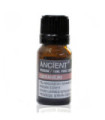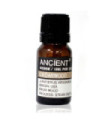Latin Name: Citrus Aurantium
Plant Part Used: Flowers
Origin: Tunisia
Extraction Technique: Steam Distillation
Neroli oil, extracted from the blossoms of the bitter orange tree (Citrus aurantium var. amara), also known as Neroli bigarade, has a scent resembling bergamot. The delicate blossoms are manually collected and the oil is obtained through water distillation, as steam distillation is too harsh for the flowers. This essential oil is highly appreciated for its delightful aroma and therapeutic benefits.
Neroli Essential Oil is renowned for its calming properties, reportedly aiding in alleviating chronic anxiety, shock, fear, depression, and stress. It's also thought to soothe intestinal spasms, colitis, and diarrhoea. With its sedative nature, it's beneficial for individuals with insomnia, heart palpitations, neuralgia, and vertigo. It's beneficial to warm some in an oil burner in a convalescent's room. Topically, Neroli oil is reputed to stimulate skin cell regeneration and combat scar tissue, promoting smoother skin, reducing stretch marks, and healing broken capillaries.
Neroli oil is thought to have been utilized by the Romans. In 1680, Princess Anna Maria Orsini of Nerola popularized the essence of the bitter orange tree by using it to scent her gloves and bath, thus creating a new trendy fragrance. Henceforth, the essential oil was named Neroli in her honor. Folklore recounts that these orange blossoms were used to adorn bridal beds, aiding in relaxing the newlyweds. The oil production is expensive and requires careful handling as the blossoms must be harvested at the peak of their bloom.




